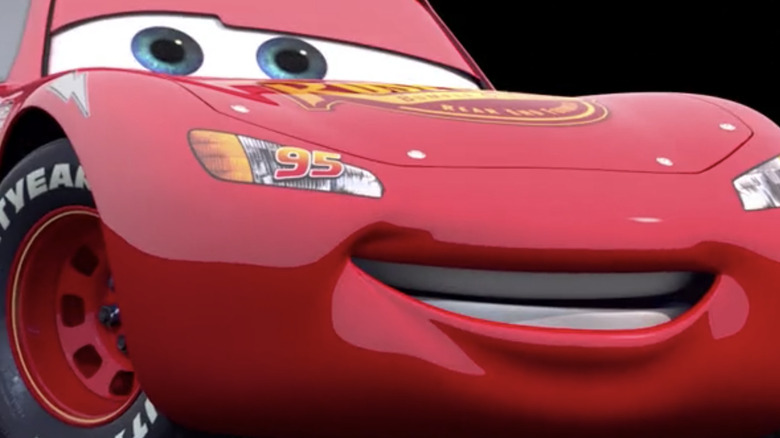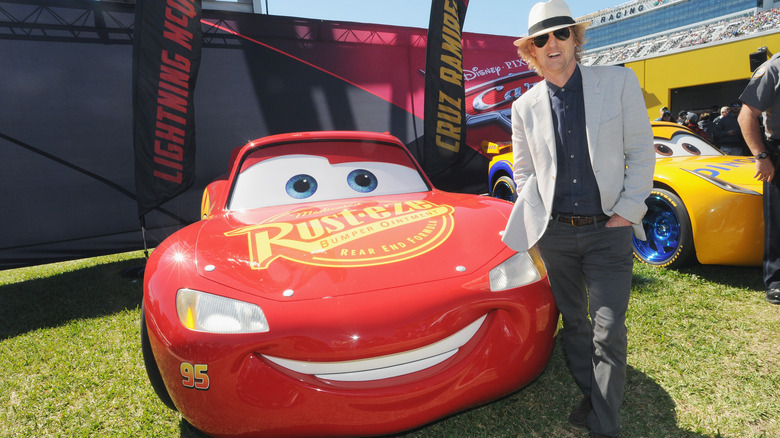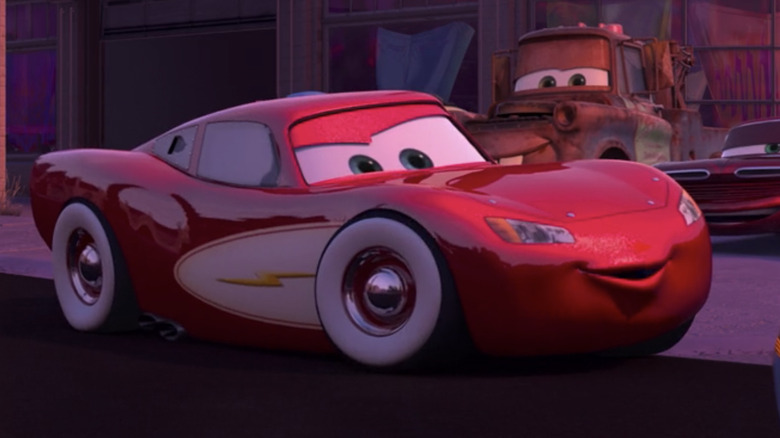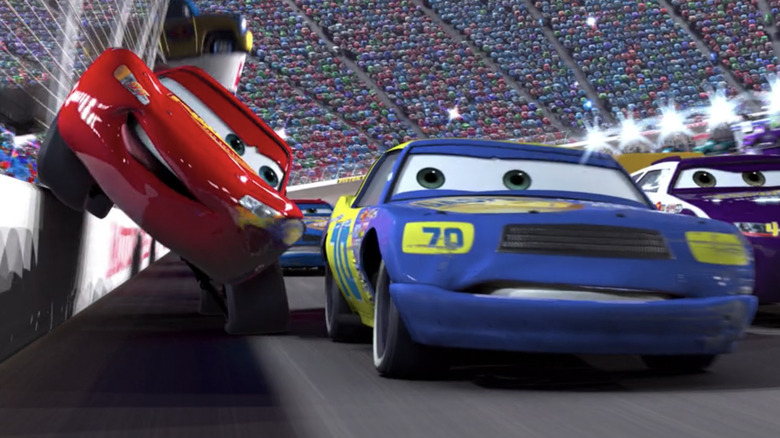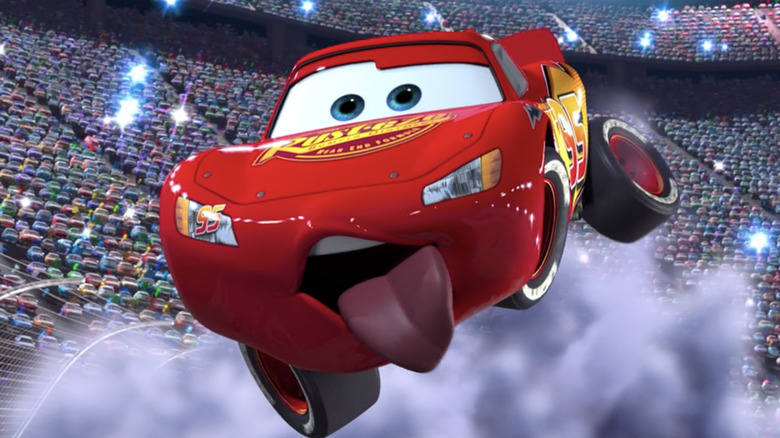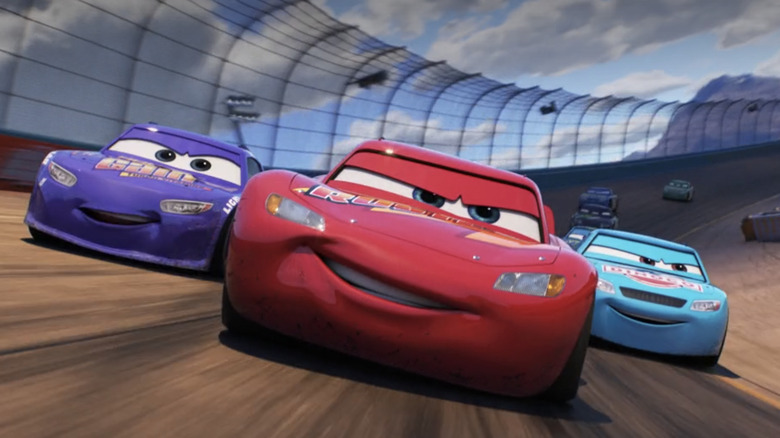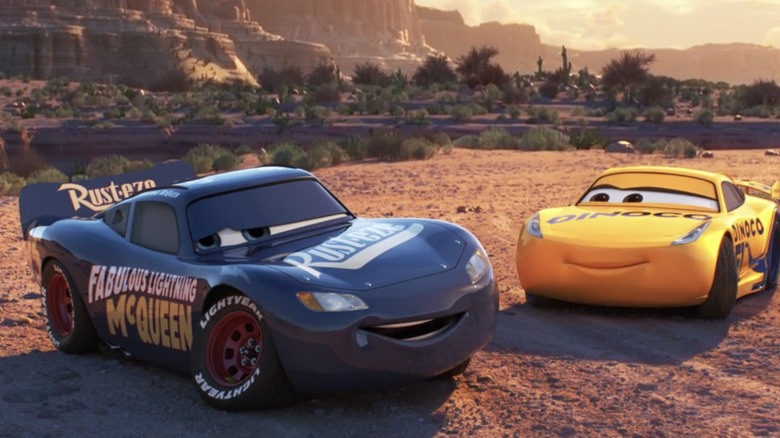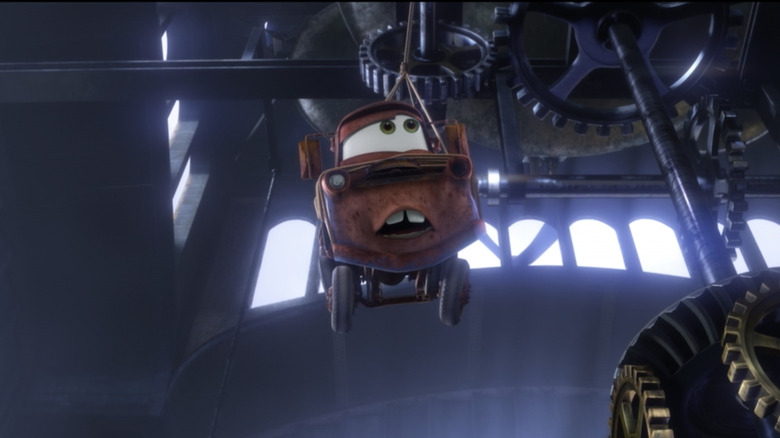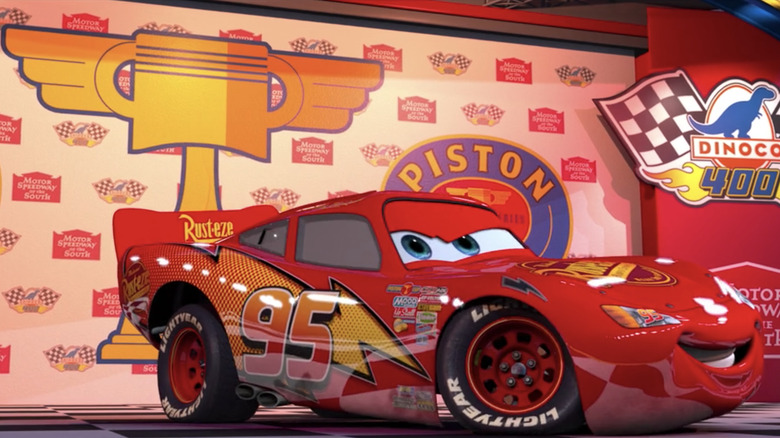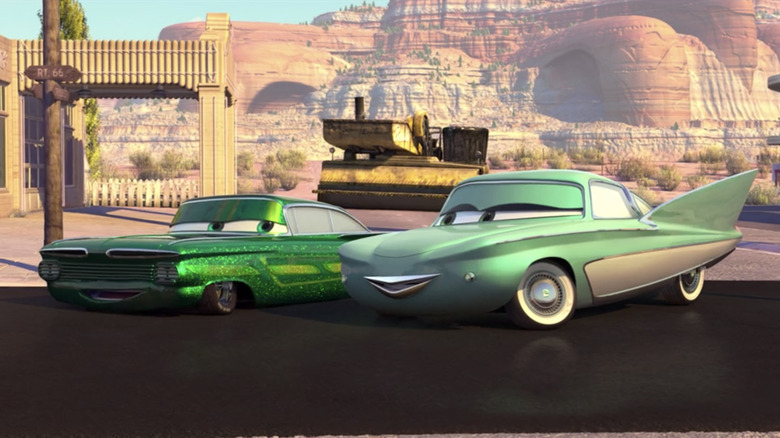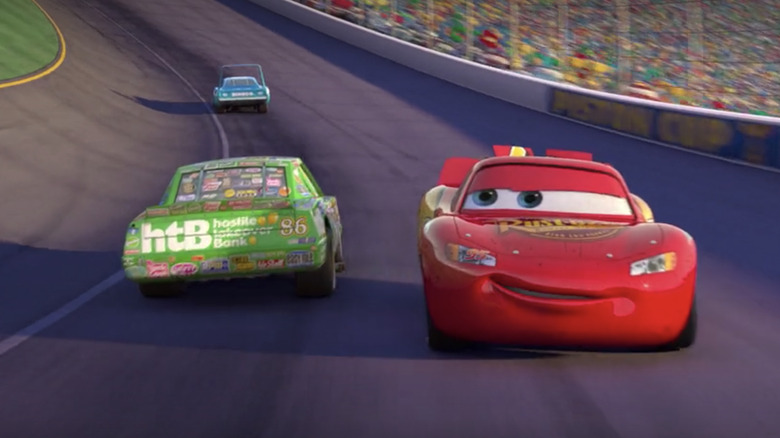The Untold Truth Of Lightning McQueen
We may receive a commission on purchases made from links.
When Pixar released its seventh film in 2006, there was no real reason to suspect a change on the horizon. This was, after all, smack in the middle of the studio's most stunning period of creative output — they had kicked off the decade with "Monsters Inc," "Finding Nemo," and "The Incredibles," and would close it out with "Ratatouille," "WALL-E," and "Up." But while all those films are considered classics, it was "Cars" that would ultimately become Pixar's bread and butter; three primary movies, two "Planes" spin-offs, and a plethora of short films have given "Cars" an animated world of anthropomorphism rivaled only by "Toy Story." With the announcement of the 2022 Disney+ series "Cars on the Road," that margin is getting even slimmer.
Of course, spin-offs aside, you can't have a new "Cars" story without the face of the franchise, speedy crimson racecar Lightning McQueen. On the surface, Lightning is pretty easy to explain: he's fast, he's red, he says "ka-chow!" Dig a little deeper, however, and you'll find some interesting secrets hiding beneath the hood. It's time to drop the checkered flag and careen headlong into the untold truth of Lightning McQueen.
Please keep in mind that this article will contain spoilers for the "Cars" films, so if that's a problem, hit the brakes now!
He's voiced by Owen Wilson
In a world where animated sequels don't always bother to bring back the talent used by their predecessors, it's nice to have had Owen Wilson sticking around all these years as the voice of Lightning McQueen. He's in all three of the main "Cars" movies, and even a couple of the shorts, and "Cars on the Road" will see him reprise the role once again. So far there have been no confirmed plans for a fourth movie — though Wilson controversially toyed with a fictional "Cars 4" script on an episode of "Saturday Night Live."
Wilson's performances are integral to making McQueen work as a character. There's a sense of wide-eyed wonder that consistently defines Lightning (even in "Cars 3," which sees him struggling with getting older), and Wilson's signature laid-back delivery is the perfect vehicle for that kind of enduring innocence. The first film's animators have confirmed that Wilson's casting influenced the development of Lightning's personality, and we know he cares enough about the franchise to have theories on how the world of "Cars" works. Outside of a few shorts (in which voice actor Keith Ferguson does his best Wilson impression), it's difficult to imagine anyone but Wilson playing the role of Lightning McQueen. Maybe someday his kids will even realize it's him doing the voice.
His design is a mashup of many different cars
For anyone who knows their automobiles, most of the cars in "Cars" are easy to identify — they are based on vehicles from the real world, and their designers were meticulous in crafting them to look and operate like their non-fictional counterparts. The exception to this rule, however, is Lightning McQueen.
From a story perspective, there's a very good reason for this: McQueen is special. The makers of "Cars" wanted their main character, who's a rookie sensation on the racing circuit, to look unique, like something the competition had never seen before. According to production designer Bob Pauley, the design team (most of whom had nurtured a love for cars since childhood) crafted Lightning by mashing together all their favorite vehicular elements, ultimately coming up with something entirely new. So, when McQueen shows up and starts instantly lapping his more experienced opponents, it's not just because he's talented. It's because he is, quite literally, made different.
He moves like an athlete, not like a vehicle
McQueen's visual design isn't the only thing that sets him apart from the other cars on the racetrack (and possibly helps him win). He doesn't just look different from the competition, he also moves different — so different, in fact, that he doesn't move like a car at all.
As explained by directing animator James Ford Murphy, McQueen's movements are inspired not by actual vehicles like the other cars, but by "surfers and snowboarders and Michael Jordan, these truly great athletes and the beauty of how they move. You watch Jordan in his heyday against every other player, he's playing a different game. We wanted to have that same type of feeling."
Examples of this are littered throughout the movies and are particularly notable in the opening sequence of the original "Cars" film, depicting a race to determine the winner of the prestigious Piston Cup. It's our introduction to both McQueen and the world he inhabits, and as planned, his movements immediately set him apart. Lightning squeezes past one race car, pushing off the side of the track as though he has feet instead of wheels. He dodges through a massive crash, a feat of agility that culminates in him leaping through the air and bouncing off a fallen opponent. And of course, after blowing two tires on the final stretch, he is reduced to desperate hopping, an image evocative of an athlete trying to play through an injury.
He has a freakishly long tongue
The final element of McQueen's visual design that stands out — or sticks out, in this case — is his absurdly long tongue, a piece of bizarre vehicular anatomy that plays a strangely important role in the original film. McQueen seems somewhat proud of his tongue in "Cars," sticking it out triumphantly during his big slow motion jump from the crash wreckage as the cameras flash around him — it shows a certain amount of athletic cockiness, and is undoubtedly another reference to Jordan in his prime.
It's also, luckily for him, quite functional. That first Piston Cup race finishes in a tie between Lightning and his two closest competitors, "The King" Strip Weathers and Chick Hicks. Lightning is only part of that tie, however, thanks to his freakish length of tongue, the tip of which crosses the finish line at the exact same time as Weathers and Hicks. Later, when "Cars" shows us the sports media coverage of the race, we see that one clever headline crafter has come up with "Tongue Tied!"
Lightning's tongue gets significantly less screen time after this scene, which is a shame, since it would be fun to see him engage in more tongue-related shenanigans. It is, however, iconic enough that at least two different models of Lightning McQueen toy car can be purchased with that ridiculous tongue coming out of his face.
He has no origin story
Now that we've covered the visual and vocal elements of McQueen, it's time to look at Lightning as a character. And interestingly, one of the first things that must be noted about Lightning is his near-total lack of an origin story. Most movies, animated or otherwise, take at least a cursory interest in their protagonist's backstory, but not "Cars" — we know almost nothing about Lightning's history prior to the first film, and so far the franchise has demonstrated no George Lucas-like intention of filling in the cracks.
Here's the entire list of what we know. Lightning has dreamed about winning the Piston Cup his entire life, and he was totally unknown before his breakout rookie season. That sounds like a recipe for some sort of future reveal, maybe a deep, dark secret that comes up at the least opportune time somewhere down the road, but so far, nope. Those two facts are still basically all fans have. "Cars 2" offers no insights, and "Cars 3" provides its own version of the same problem, giving Lightning two hastily-sketched new friends whose entire purpose is to retire and make McQueen feel old. We don't learn much about what Lightning has been doing in the years since "Cars 2," and what we do learn doesn't build on previous events. Fans who want to know more about Lightning McQueen's background will have to hope "Cars on the Road" chooses to provide more information.
He's defined by his friendships
Actually, there is one other thing we know about McQueen at the beginning of the first "Cars" movie: He's a loner. He opens the film by proclaiming himself "a one-man show," a declaration that loses him his pit crew — though he later shows himself to be so desperate for friendship that he tries to hang out with his agent. We've never learned what caused Lightning to become so isolated, but if the "Cars" franchise isn't interested in giving him an origin story, it might be because it's so intensely interested in giving him friends. In fact, despite the fact that McQueen has a regular love interest in the form of Sally Carrera, his character is defined by friendship far more than romance.
Lightning's friendships with Radiator Springs citizens Mater, Doc Hudson, and even Luigi and Guido (who all attend the Piston Cup race at the end of the first film) jump-start both his chances of victory and his personal growth far more deeply than his relationship with Sally (who doesn't). His primary storyline in "Cars 2" also involves his friendship with Mater, and in addition to his racing buddies at the beginning, "Cars 3" revolves around Lightning's friendship with newcomer Cruz Ramirez. When he appears at the end of that film painted in the style and colors of his old buddy the Hudson Hornet, McQueen's themes of selflessness and community come full circle.
He's not always the main character
If you only know one character from "Cars," it's probably Lightning McQueen. However, the word "probably" is doing an unusual amount of work in that sentence.
That's because Lightning has some competition in the "Cars" popularity contest from his pal Mater, a tow truck voiced by comedian Larry the Cable Guy. In fact, Mater was popular enough that he briefly supplanted McQueen as the central protagonist of the "Cars" franchise. The tow truck's takeover began in 2008, when he starred in a series of shorts called "Mater's Tall Tales," and reached its apex in 2011, when he officially shed his comic relief sidekick status and became the main character of "Cars 2," rendering Lightning a mere deuteragonist.
"Cars 2" represented a departure in more ways than one, as the largely-incompetent Mater bumbled his way through a convoluted spy story while McQueen's racing happened off to the side. In fact, "Cars 2" is essentially a feature-length episode of "Mater's Tall Tales," which featured Mater navigating a variety of unlikely situations.
In 2017, "Cars 3" returned the action to the racetrack, and the keys to the franchise were given back to Lightning McQueen; Mater barely features in the film at all. Even that film, however has McQueen sharing the spotlight, partially with Cruz (voiced by Cristela Alonzo), and even partially by the deceased Doc Hudson (the late Paul Newman), whose backstory is explored far more than that of McQueen. "Cars on the Road," meanwhile, will star both Mater and McQueen.
He's a winner, eventually
The "Cars" films don't get as much love from critics as the rest of Pixar's oeuvre, but it should be mentioned that the first installment includes one of the best sports movie endings ever. Sports movies invariably come down to a climactic "big game" sequence, in which the main character or characters either win the big game and send the audience home happy, or lose it, usually in the service of a story about perseverance and trying your best. "Cars," on the other hand, pulls a "Rocky" — deftly threading the needle between winning and losing, but ultimately driving home a grander message about the value of a person's character. Lightning clearly could have won the big race at the end, but chose to sacrifice his victory to help someone else; Rocky didn't win, but he went the distance. Employing such a "third" option allows both films to have a feel-good ending, while remaining true to their themes.
Still, even though Lightning stopped himself inches from the finish line, it would be nice to know for sure that McQueen eventually does win the Piston Cup. Fortunately, the second and third films provide that reassurance, as Lightning has won four Piston Cups by the start of "Cars 2" and seven by the start of "Cars 3." His eighth Piston Cup win ends up getting split with Cruz (who also emerges victorious from a hellacious demolition derby, featuring the most intimidating school bus in cinematic history).
He's a master road paver, apparently
Lightning McQueen is an indisputably great racer, but that doesn't mean he isn't good at other things, too. In fact, looking at the evidence on display in "Cars," it's possible that despite all his success on the track, he may have missed his calling as a road paver.
The plot of the original "Cars" sees Lightning forced into community service after inadvertently cutting a swath of destruction through the small town of Radiator Springs. His task: to re-pave the town's main road, fixing the long gash his shenanigans had left in it. Naturally, the film is primarily interested in Lightning's selfishness and repeated attempts to get out of the work, but when he does finally buckle down and start paving properly, he does a good job. In fact, he does a great job. "I haven't seen a road like this in years," gushes the lowrider body artist Ramone. According to Luigi, the road looks "like it was paved by angels," while Mater proclaims "I'll bet even the roads on the moon ain't this smooth!"
It would be one thing if Lightning, who as far as the audience knows has never done anything close to this sort of manual labor before, was able to pave passably well in his first attempt, but this kind of praise is a whole different level of effusive. Either McQueen secretly possesses the soul of a true road paver, or the cars of Radiation Springs just have very low standards.
He can drive backwards, inexplicably
Champion racer? Absolutely. Wondrous road paver? Sure, that's within the realm of possibility. But Lightning McQueen has one more trick up his sleeve, and it involves total defiance of the laws of physics.
At one point in "Cars," while talking to McQueen, Mater declares himself "the world's best backwards driver," and goes on to prove it with an impressive, occasionally acrobatic display of backwards driving. When Lightning asks him how he does it, Mater replies, "Rear-view mirrors. We'll get you some and I'll teach you, if you want," waggling the mirrors in question as he speaks.
It's unclear when this training would have actually taken place, but as you might expect, Lightning uses his newfound skills at backwards driving during a crucial point in the big climactic race, with Mater crying "I taught him that!" from the sideline. Only, here's the thing: Lightning very clearly does not have rear-view mirrors during that race. And it's not as though Mater offers any other explanation for his skills — he can drive backwards because he has the mirrors, full stop.
The fact that Lightning drives backwards without rear-view mirrors is impossible to explain. Could the world of "Cars" contain a secret order of vehicular wizards, and the reason Lightning's origin story is so mysterious is because he actually has magical car powers? Unlikely. But then again, such a revelation would take "Cars on the Road" in some interesting new directions.
